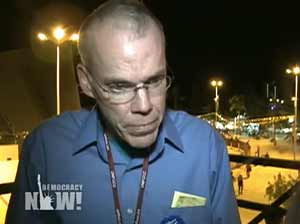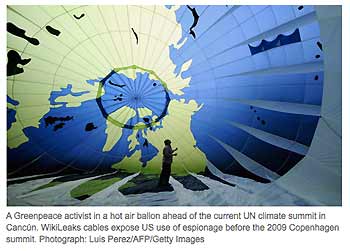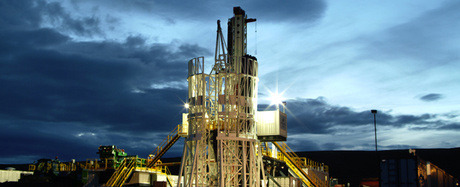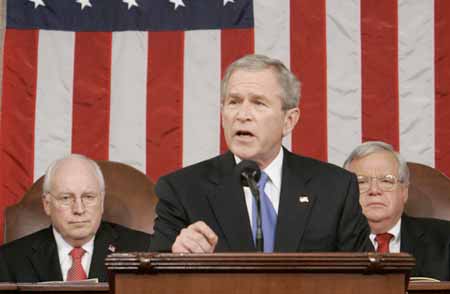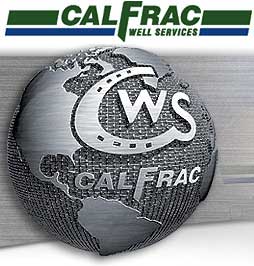Biblio
Silhouetted against the sky at dusk, excess steam, along with non-scrubbed pollutants, spew from the smokestacks at Westar Energy's Jeffrey Energy Center coal-fired power plant near St. Marys, Kan. Credit: AP Photo/Charlie Riedel.
In the name of job creation and clean energy, the Obama administration has doled out billions of dollars in stimulus money to some of the nation’s biggest polluters and granted them sweeping exemptions from the most basic form of environmental oversight, a Center for Public Integrity investigation has found.
The administration has awarded more than 179,000 “categorical exclusions” to stimulus projects funded by federal agencies, freeing those projects from review under the National Environmental Policy Act, or NEPA. Coal-burning utilities like Westar Energy and Duke Energy, chemical manufacturer DuPont, and ethanol maker Didion Milling are among the firms with histories of serious environmental violations that have won blanket NEPA exemptions...
...Documents obtained by the Center show the administration has devised a speedy review process that relies on voluntary disclosures by companies to determine whether stimulus projects pose environmental harm. Corporate polluters often omitted mention of health, safety, and environmental violations from their applications.
Related Stories:
NEPA Exemptions: The Dirty Dozen List
Wisconsin Firm Receives Energy Grant Despite Chronic Pollution Problems
See: Pollution in Your Community | Scorecard
See: A Life’s Value May Depend on the Agency, but It’s Rising
See: Climate Co-benefits and Child Mortality Wedges
See: U.S. Environmental Protection Agency (EPA): Hydraulic Fracturing Study (2010-2012)
Democracy Now! caught up with McKibben at the Cancún Climate Conference in Mexico. We asked for his reaction to the diplomatic cables released by WikiLeaks showing how the U.S. manipulated last year’s climate talks in Cancún.
Some of the new data [Wikileaks] coming out today makes it clear that everyone’s suspicion that the U.S. was both bullying and buying countries into endorsing their do-little position on climate were even sort of worse than we had realized...
...They [The U.S. Congress] think because they can change the tax code, they can change the laws of nature...
...this U.N. process, has been going on forever, and it’s getting nowhere, and it’s not going to get anywhere substantive, until we have some power from the outside to push it.
"It’s just like a family reunion aboard the Titanic, you know?" And that’s sort of what it feels like. We can’t keep doing this. Until we can build some power outside of these arenas to actually push these guys, you know, this is—in the end, it’s not about how well people are communicating or how great the policy papers are. It’s on who has the power. And at the moment, that power rests in the hands of the fossil fuel industry and their allies in governments around the world.
And until we build some independent outside movement power to push back, then we’re never going to get—we’re going to get scraps from the table, at the very best.
See: Damian Carrington. "WikiLeaks cables reveal how US manipulated climate accord." The Guardian.co.uk. 2010-12-03.
See: Ian Traynor. "WikiLeaks cables: Cancún climate talks doomed to fail, says EU president." The Guardian.co.uk. 2010-12-03.
BJ is one of the large companies being investigated by the U.S. House Energy and Commerce Committee to see if the gas extraction method known as hydraulic fracturing, or fracking, is a hazard to groundwater drinking supplies.
The Houston Chronicle reported that Texas Democratic gubernatorial nominee Bill White, 2010, may have had a conflict of interest during his term as mayor of Houston. Bill White earned more than $2.6 million serving on the board of a gas well servicing company that now is part of a congressional investigation into possible groundwater contamination.
White, who made cleaning Houston's polluted air a hallmark of his tenure as Houston's mayor, has been on the board of BJ Services Co. since 2003, the year he was elected, earning more than $627,000.
White also received almost $830,000 in stock and another $245,000 in stock options. He will receive an additional $180,000 in stock and a retirement payout of $783,000 if the firm's merger with Baker Hughes is approved by shareholders Friday.
See: 03/31/2010--Baker Hughes and BJ Services Stockholders Approve Merger
From the web site: "BJ Services has earned a reputation for providing reliable fracturing services for virtually every major shale oil and gas operator. Since 1981, our skilled engineers and crews have successfully designed and pumped more than 21,500 shale frac treatments around the world. We know that every shale formation is different and we offer the most advanced fracturing technologies–the right fluids, proppants and equipment–needed to “crack the code” for optimum frac designs and operations."
Black Warrior Riverkeeper's mission is to protect and restore the Black Warrior River and its tributaries. The Black River Watershed in Alabama provides water to over a million people.
We are a citizen-based nonprofit organization dedicated to improving water quality, habitat, recreation, and public health throughout our patrol area, the Black Warrior River watershed. This vital river basin is home to over a million people and is entirely contained within Alabama.
There are over four thousand coalbed methane wells in the Black Warrior River watershed. Tens of thousands of acres are leased to this practice, creating a massive network of roads and well pads. The extraction of coalbed methane involves a process known as hydraulic fracturing.
See: Affirming Gasland.
See: Max Shelby. Dec. 19, 2010. Black Warrior Riverkeeper Newsletter--Sheperd's Bend Coal Mine Fight Continues. Vincent Alabama Confidential.
Texas based blogger "TXsharon".
"I'm a landowner and a mineral owner on top of the Barnett Shale.
If you want to know how I became known as TXsharon and why industry tries to discredit me by calling me a "left-wing lunatic with a socialists agenda," you can read about it here: How I became a "Far Left Radical with a socialist agenda," etc. And, yes, I'm a mineral owner.
In January 2010, I started working for Texas Oil and Gas Accountability Project on a very part-time basis. I am likely the only person in Texas who gets paid for helping Texans who are negatively effected by oil and gas development. We hope to make my position full-time soon."
See: Cheney Helped Halliburton Hide Secrets About Dangerous Chemicals in YOUR Drinking Water. Tue Nov 25, 2008 at 08:36:40 AM CST.
See: "Doodygate".
See TxSharon's Diary on the Daily Kos.
See Barnett Shale: Aerial View and Cattle Drink Drilling Waste
After BP’s Texas City, Tex., refinery blew up in 2005, killing 15 workers, the company vowed to address the safety shortfalls that caused the blast.
The next year, when a badly maintained oil pipeline ruptured and spilled 200,000 gallons of crude oil over Alaska’s North Slope, the oil giant once again promised to clean up its act.
In 2007, when Tony Hayward took over as chief executive, BP settled a series of criminal charges, including some related to Texas City, and agreed to pay $370 million in fines. “Our operations failed to meet our own standards and the requirements of the law,” the company said then, pledging to improve its “risk management.”
Despite those repeated promises to reform, BP continues to lag other oil companies when it comes to safety, according to federal officials and industry analysts. Many problems still afflict its operations in Texas and Alaska, they say. Regulators are investigating a whistle-blower’s allegations of safety violations at the Atlantis, one of BP’s newest offshore drilling platforms in the Gulf of Mexico.
Now BP is in the spotlight because of the April 20 explosion of the Deepwater Horizon, which killed 11 people and continues to spew oil into the ocean. It is too early to say what caused the explosion. Other companies were also involved, including Transocean, which owned and operated the drilling rig, and Halliburton, which had worked on the well a day before the explosion.
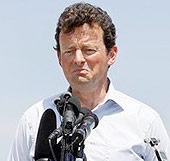
BP, based in London, has repeatedly asserted that Transocean was solely responsible for the accident.
See: BP to pay $15 million for Texas air pollution violations. Reuters. Sept. 30, 2010.
See: Cain Burdeau. "Scientists Find Damage to Coral Near BP Well." AP. Coastal Care. Nov. 6, 2010.
BP's Tony Hayward tells World Economic Forum of 'game changer' technique to serve world's energy needs.

Excitement in the industry over "unconventional" gas supplies has led to a wave of investment in America which Tony Hayward, BP's chief executive, believes could eventually spread around the world.
BP inherited a major stake in shale operations when it took over Amoco 12 years ago, but has added to that by spending $1.75bn buying shale interests from rival Chesapeake Energy in the summer of 2008. Last November BP showed its determination to extend the use of the techniques when it signed a production-sharing agreement with the government of Indonesia to exploit new reserves in Kalimantan.
See: BP Deepwater Horizon Committee Hears From Oil Industry Executives
See: National Commission on the BP Deepwater Horizon Oil Spill and Offshore Drilling
See: Before the Big Spill
In a speech in Buenos Aires last year, BP Chief Executive Tony Hayward called this "a quiet revolution...in the gas fields of North America."
New techniques like hydraulic fracturing and horizontal drilling are opening up new gas resources that could last the U.S. between 50 and 100 years, he said.
"One field where these techniques were pioneered--the Barnett Shale near Fort Worth in Texas--has almost single-handedly turned around the production of natural gas in the U.S.," Hayward said.
BP made its entry into U.S. shale gas in 2008 when it acquired 90,000 acres of the Arkoma Basin Woodford Shale play and 135,000 acres of the Fayetteville shale from Chesapeake Energy for $2.85 billion in cash.
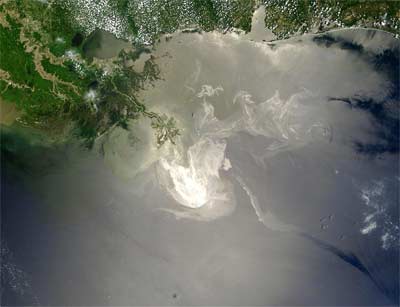
Photo: UC Santa Barbara Geography Department. The Deepwater Horizon oil spill in the Gulf of Mexico as seen from space by NASA's Terra satellite on May 24, 2010. The spill has yet to be contained and is the worst oil spill in US history.
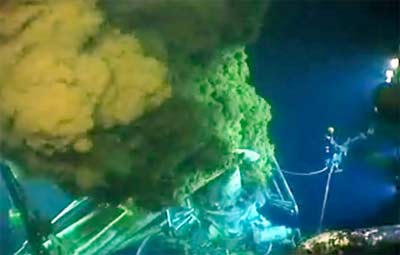
View of the Macondo well leaking oil in the Gulf of Mexico.
The subject of gas drilling in the Marcellus may be looked at in its historical, legal and scientific contexts. The need to heal the ineffective and mistrustful relationship between environmentalists, the U.S. government and the international energy industry concerning the preservation of American air and water becomes more urgent by seeing images like these.
See: Kara Cusolito. The Nation. "The Next Drilling Disaster".
On Sunday, Sept. 26, a committee of the National Academy of Engineering and National Research Council that is conducting an analysis of the causes of the Deepwater Horizon explosion and oil spill held a public meeting to hear from Mark Bly, group head of safety and operations for BP, and other company representatives about BP's recently released accident investigation report. Also on the agenda were executives from Halliburton and Shell Oil.
- Photos
- Webcast Audio Part 1 (Opening Remarks, BP Presentation)
- Webcast Audio Part 2 (Q&A with Committee and BP)
- Webcast Audio Part 3 (Halliburton Presentation and Q&A)
- Webcast Audio Part 4 (Shell Presentation and Q&A)
- Meeting Agenda
- Project Information
See: "More Questions About BP’s Limited Investigation Into Gulf Disaster".
See: Dave Cohen. Energy Bulletin. "Shale Gas Shenanigans."
See: National Commission on the BP Deepwater Horizon Oil Spill and Offshore Drilling
See: The Questions BP Didn’t Answer
See: Tracking the Oil Spill in the Gulf | Interactive Map
For more on the estimates, see these articles:
May 14: Size of Oil Spill Underestimated, Scientists Say
May 28: Estimates Suggest Spill Is Biggest in U.S. History
June 7: Rate of Oil Leak, Still Not Clear, Puts Doubt on BP
June 10: New Estimates Double Rate of Oil Leak
June 15: Panel Sharply Raises Estimate of Oil Spill
Aug. 2: Gulf Spill Is the Largest of Its Kind
See: Cain Burdeau. "Scientists Find Damage to Coral Near BP Well." AP. Coastal Care. Nov. 6, 2010.
See: Peter Hart. July 2010. "Still Drill, Baby—Despite Spill
Little rethinking of oil after Deepwater disaster." FAIR. (Fairness and Accuracy in Reporting)
See New Book:
Institute of Medicine, Margaret A. Mccoy, and Judith A. Salerno. Assessing the Effects of the Gulf of Mexico Oil Spill on Human Health: A Summary of the June 2010 Workshop. National Academies Press, 2010.
President Bush delivers his 2006 State of the Union address, where he famously stated that “America is addicted to oil.” AP/Pablo Martinez Monsivais
Rebecca Lefton includes a timeline: 2001-2008 of the Bush Presidency's corrupt energy policy.
BP’s oil disaster in the Gulf of Mexico is without a doubt former Vice President Dick Cheney’s Katrina. President George W. Bush and Cheney consistently catered to Big Oil and other special interests to undercut renewable energy and energy efficiency initiatives that would set the United States on a more secure clean energy path.
Oil companies raked in record profits while benefitting from policies they wrote for themselves. These energy policies did nothing for our national security and left consumers to pay the price at the pump and on their energy bills, which rose more than $1,100 during the Bush administration.
See: The Bill From Bush’s Broken Energy System
Read also: The Prelude to Cheney's Katrina by Joshua Dorner
by Abrahm Lustgarten, ProPublica - April 7, 2010.
Series: Buried Secrets: Gas Drilling's Environmental Threat.
A federal study of hydraulic fracturing set to begin this spring is expected to provide the most expansive look yet at how the natural gas drilling process can affect drinking water supplies, according to interviews with EPA officials and a set of documents outlining the scope of the project.
The research will take a substantial step beyond previous studies and focus on how a broad range of ancillary activity – not just the act of injecting fluids under pressure – may affect drinking water quality.
The oil and gas industry strongly opposes this new approach. The agency’s intended research "goes well beyond relationships between hydraulic fracturing and drinking water," said Lee Fuller, vice president of government affairs for the Independent Petroleum Association of America in comments (PDF) he submitted to the Environmental Protection Agency.
See 22 page Powerpoint, Hydraulic Fracturing Applicability of the Safe Drinking Water Act and Clean Water Act Science Advisory Board Discussion.(2010).
Cabot Oil & Gas Corporation, headquartered in Houston, Texas, is a leading independent North American natural gas producer. The company’s reserves are focused in both conventional and unconventional basins in Appalachia, the Rocky Mountains, the Mid-Continent and the Gulf Coast.
See: Cabot Oil & Gas’s Marcellus Drilling to Slow After PA Environment Officials Order Wells Closed. Lustgarten, Abrahm. ProPublica. (2010).
See: Commonwealth of Pennsylvania DEP takes aggressive enforcement action against Cabot Oil
See: Associated Press. December 16, 2010. The Wilkes-Barre Times Leader. "Gas driller to pay $4.1 million in settlement."
HARRISBURG — The state Department of Environmental Protection has abandoned its plan to force a Houston-based drilling company to pay nearly $12 million to extend a public water line to residents whose wells have been contaminated with methane gas, citing a lack of political support.
Environmental regulators say Cabot Oil & Gas Corp. instead will pay residents of Dimock a total of $4.1 million under a settlement with the company announced late Wednesday. Cabot also has agreed to pay to install whole-house gas mitigation systems in each of the 19 affected homes.
The settlement infuriated residents, who say the DEP caved to political pressure.
See also:
- Legere. Hazards posed by natural gas drilling are not limited to below ground
- Legere. Cabot and DEP clash over Dimock water contamination
- Lippert. Shale Gas Costing 2/3 Less Than OPEC Oil Incites Water Concern
- Lustgarten. Frack Fluid Spill in Dimock Contaminates Stream, Killing Fish.
- Lustgarten. Pennsylvania Orders Cabot Oil and Gas to Stop Fracturing in Troubled County
- McFerrin. Fight Over Gas Wells in Chief Logan Heads to Supreme Court
- Noell. Natural Gas Drilling Threatens Communities in Northeastern United States
- Piette. Water All Around … Or is There?
by Abrahm Lustgarten, ProPublica - April 16, 2010.
More than 15 months after natural gas drilling contaminated drinking water in Dimock, Pa., state officials are ordering the company responsible -- Houston-based Cabot Oil and Gas -- to permanently shut down some of its wells, pay nearly a quarter million dollars in fines, and permanently provide drinking water to 14 affected families.
The order is among the most punitive in Pennsylvania's history and reflects officials' frustrations over a string of drilling-related accidents. The record of spills, leaks and water contamination in Pennsylvania -- several of which are tied to Cabot -- has spotlighted the environmental risks of drilling for natural gas across the country, jeopardized development of the massive Marcellus Shale resource deposit, and contributed significantly to actions by both Congress and the U.S. Environmental Protection Agency to bolster federal oversight of drilling.
"The events at Dimock have been the black eye for the industry and have also been a black eye for Pennsylvania," the state's chief environment official, John Hanger, told ProPublica. "It's been an enormous headache. If Cabot doesn't get this message, the company has got an amazing hearing problem."
CalFrac is one of the companies the U.S. House Committee on Energy and Commerce is investigating on the potential environmental impacts from hydraulic fracturing.
"Hydraulic fracturing operations are constantly improving through advances in technology, which are intended to translate into cost savings and enhanced production for Calfrac’s customers."









